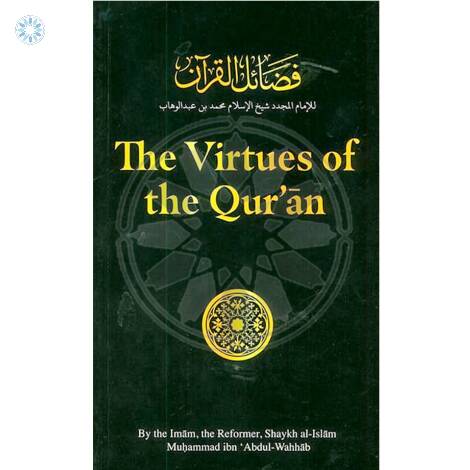The Virtues of the Qu'ran
When Muslims are asked about their Islamic beliefs we refer to the Qu'ran and Sunnah as a standard response. Yet, how often do we actually read these two sources of knowledge? In fact, when was the last time we read a chapter from the Qu'ran and reflected on its meaning? How many of us even know the virtues of the Qu'ran let alone its explanation? In your hands you have a translation of the tremendous book, Fada'il al-Qu'ran (the Virtues of the Qur'an), which was written by one of the greatest scholars of Islam, Shaykh Muhammad ibn 'Abdul-Wahab.
About The Author
Muḥammad ibn ʿAbd al-Wahhāb ibn Sulaymān at-Tamīmī
Muḥammad ibn ʿAbd al-Wahhāb ibn Sulaymān at-Tamīmī (: مُحَمَّدُ بنُ عَبْدِ الوَهَّابِ بنِ سُلَيْمَانَ التَّمِيْمِيُّ; 1703 – 22 June 1792) was a religious leader, reformer, scholar and theologian from Najd in central Arabia, attributed as the founder of the Islamic doctrine and movement known as Wahhābism.His prominent students included his sons Ḥusayn, ʿAbdullāh, ʿAlī, and Ibrāhīm, his grandson ʿAbdur-Raḥman ibn Ḥasan, his son-in-law ʿAbdul-ʿAzīz ibn Muḥammad ibn Saʿūd, Ḥamād ibn Nāṣir ibn Muʿammar, and Ḥusayn āl-Ghannām.
Additional Product Information
- ISBN 13: 978-191399-80-11
- ISBN 10: 1913998011
- ISBN: 9789351690948
- SKU: 24862
- Author: Muḥammad ibn ʿAbd al-Wahhāb ibn Sulaymān at-Tamīmī
- Publisher: MuSunnah Publications
- Edition: 1st Edition
- Size: 17 x 15 Cm
- Pages: 75
- Weight: 200g Aprox
Share
You may also be interested in
-
 Our Legends Luminaries who Revived Islam
Our Legends Luminaries who Revived IslamEvery now and then some great people have come along to protect and revive Islam. This short and well-presented book highlights a small selection of specific personalities from our rich tradition who served as found...
£10.00 -
 Abridged Biography of Prophet Muhammad (Peace be upon him) Mukhtasar Seerah Ar-Rasool
Abridged Biography of Prophet Muhammad (Peace be upon him) Mukhtasar Seerah Ar-RasoolDiscover the timeless legacy of Prophet Muhammad (Peace be upon him) through the esteemed pen of Imam Muhammad Ibn Abdul-Wahhab At-Tamimi. In this exclusive edition brought to you by Darussalam, delve into the illum...
£11.00 -
 Biography of the Prophet (2 Vol) (SAW)
Biography of the Prophet (2 Vol) (SAW)The Biography is in chronological order describing all the events of the life of the Prophet from his childhood till he was called by the Lord of the universe.The important phases like migration, all the expeditions...
£19.95 -
 Understanding Your Testimony Of Faith; Seven Essential Points Of Understanding
Understanding Your Testimony Of Faith; Seven Essential Points Of UnderstandingUttering the Muslim's testimony of faith, the first pillar of Islām, "Lā ilāha illā-Allāh" (There is none worthy of worship except Allāh), is very easy on the tongue, but many of us do not understand the depth of it...
£15.00 -
 An Explanation Of The Four Rules Regarding Shirk
An Explanation Of The Four Rules Regarding ShirkIn this concise yet comprehensive book, Abu Ammaar Yasir Qadhi, one of today’s most respected Islamic scholars, explains the four foundational principles laid down by Shaykh Muhammad ibn Abdul Wahhab regarding the c...
£13.95











.png|/storage/40c80590_An Explanation Of The Four Rules Regarding Shirk (2).png)








